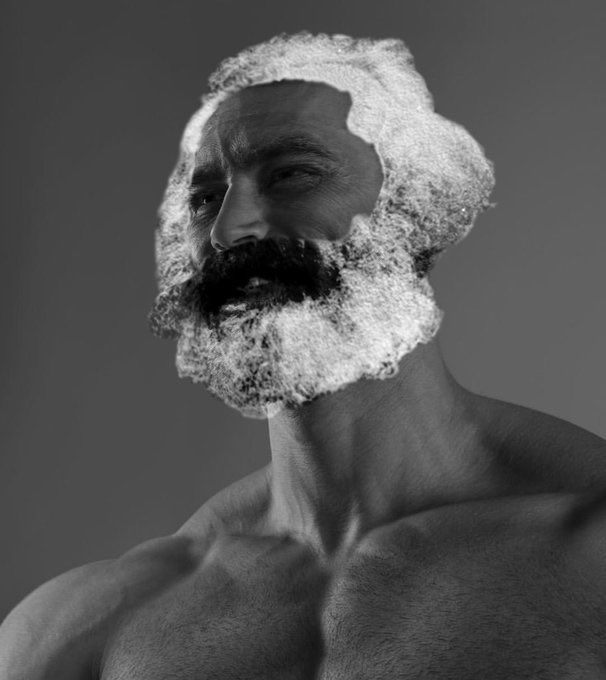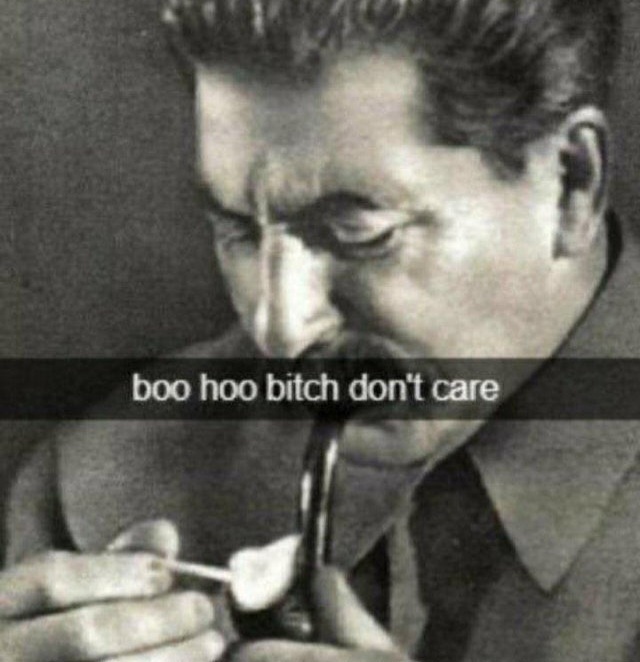"what" being the first response to engaging at all with Hegel for the first time is incredibly relatable
Read The Phenomenology of Spirit like 2.5 times in the past year and I get it, but that is objectively too many times to read a book just to be sure you understand it.
Kink does always provide the most fascinating lens through which to view society
As the bondsman creates more and more products with greater and greater sophistication through his own creativity, he begins to see himself reflected in the products he created, he realizes that the world around him was created by his own hands, thus the slave is no longer alienated from his own labor and achieves self-consciousness. The lord on the other hand has become wholly dependent on the products created by his bondsman; thus the lord is enslaved by the labour of his bondsman.
I... think I get it? :cat-confused:
I think I get it?
When you're the top it may seem like you are """in charge""" but really when you have sex and what you do is fully determined by the bottom.
At the end of the day you can only go as far as they want
I don't agree with the part where the bondsman achieves self consciousness through labor by being able to put on personal touches and the pure act of creation. Has an office worker achieved class consciousness by decorating their desk? Does an underpaid factory worker become unalienated because they see the cars they built around town?
From personal experience I can say "no".
I think I get what its supposed to say, but it seems reversed from reality(which I guess makes sense with the general statement that Marx and Engels put Hegel on his head).
Or at least its wrong about the bondsman being non-alienated just because "the world around him was created by his own hands" no matter his ownership and control of that world. Idk I guess being a useless Lord might feel alienating too but theres an easy solution to that problem.
Disclaimer, just my two cents with how I understand this stuff, which is pretty surface level, all things considered.
The alienation described by Marx and Engels comes from the Hegelian master/slave dynamic within a capitalist context of wages and profit-seeking, where the value of labor is divorced from the product of the labor in such a way that the maker/bondsman/worker does not receive the compensation his creation demands (the value of his labor). In this way, class-consciousness of labor is a collectivized equivalent to the self-actualized fulfillment that Hegel describes. Both outcomes result in the destruction of the position of the Master (Capitalist) in the social hierarchy.
Put broadly, whether you're talking philosophical or economical, the Slave exists just fine with or without the Master (as the Slave would produce for his own needs, even if the Master did not exist to demand production), while the Master cannot exist without the Slave beneath him in the hierarchy, no matter what the Master does otherwise. Slaves do not need Masters, but Masters need Slaves to observe their superior position in hierarchy. In a more pithy way, for the Master, Hell is Other People, and their only two options are to perpetuate the hierarchy forever, or witness the destruction of the self as the Master, and lower themselves to equal footing with those they once demanded reify their superiority. Obviously, that's an incredibly difficult thing for basically anyone in that position to accept without being forced to do so.
Yeah I don't know if I agree with it, I just think I get what he means.
When it's said Marx put Hegel on his head it's meant that Marx empathized the material world (base) rather than consciousness (superstructure) as Hegel did.
I hate that I can explain this and I’ll try to keep it as concise as possible but
Wall of Hegelian analysis as it relates to dom/sub relationships. Open at your own risk.
What we see here is the exploration the relationship between Master and Slave. In this specific dom/sub context, we have two parties engaging in power exchange for erotic purposes. (It is important to note, however, that unlike the traditional dialectic described by Hegel, the power dynamic in a dom/sub relationship is typically consensual and negotiated between the parties involved. Moving on–)
In this context, the dom is seen as the "master," who seeks recognition and validation from the submissive person (the "slave") through their willing submission and obedience. The dom, however, has their “power” held entirely in the hands on the sub’s (non)willingness to provide them the labor (appeasing the dom consensually, though it is important to remember that this dialectic is not traditionally based on a consensual relationship) necessary to continue the dom/sub relationship. The submissive person is, in turn, consensually seeking recognition from the dominant partner, having recognized that they indeed have given up power to the dom in return for, in this context, pleasure. The entire relationship is based on the recognition by both parties of their respective power and powerlessness as it relates to each other. Despite the “master” (dom) appearing to hold the power in this relationship, their power is inherently only affirmed through the recognition of others.
Taking this one step further, this dialectic, through a marxist perspective, is how we arrive at the concept of class conflict of owning class vs. working class
Honestly this is what happens when you universalise a specific type of D/s dynamic
I want to bring hegel to the 21st century long enough to show him polyam lesbian and trans kinksters and make him analyze it until he hits a wall and has a stroke
Ofc and writing about one specific tumblr shitpost really limits the scope of what I’m able to cover. Hegel, this is your starry sky. Look upon it and weep.
Anyway, Hegel hitting the walls and then having a stroke? Damn :panting:
I wasn't referring to the excellent shitpost(it is well within bounds for shitposts to be simple), I meant hegel (it really doesn't matter that much but I feel mildly misunderstood)
Also
:bonk:
Used this to start a discussion about Hegel and Marx among some normies today, so thanks
They thought about it! I tried to get them to think more about object/subject distinction and how M/S dynamics emerge out of it, and get away from "personifying" the roles, although there was she interesting discussion about how if the "bottom" rejects the "top" then the bottom becomes the "master," which is fraught but it wasn't me talking about Hegel at some people who didn't care, they were looking stuff up and asking about it. So productive, I would say! I had to do a little course correction when Marx came up, but honestly once it became apparent I had actually read Marx and had opinions about him vs. Hegel, that part of it kind of petered out
That's cool they took an interest in it and brought up the concept of the bottom becoming the master by rejecting it. That's a veey dialectical idea I think many would struggle with, at least when put in abstracted philosophical terms of like the negation of the negation or the unity of opposites. I'm curious about your critique of the bottom becoming the master? You called it fraught.
Sorry I was more referring to "personifying" the roles is fraught. Like, the master and the slave aren't people. Some insights may be made by putting yourself in one or the other role and switching between them, but I don't think we can really understand how these theories are internally consistent parts of a larger analytical framework by making them less abstract. It also might open the door to some personal bias sneaking into the method, as I draw conclusions based on "my experience as master and/or slave". We can't remove our selves from our thinking, but we can use caution. Maybe I'm barking up the wrong tree
No I see your point, I agree that personifying it into individuals is problematic theoretically and practically.
actually evangelion/EoE is the best explanation of hegel's master/slave dialetic
https://www.youtube.com/watch?v=Dvk5BnMdXcc










